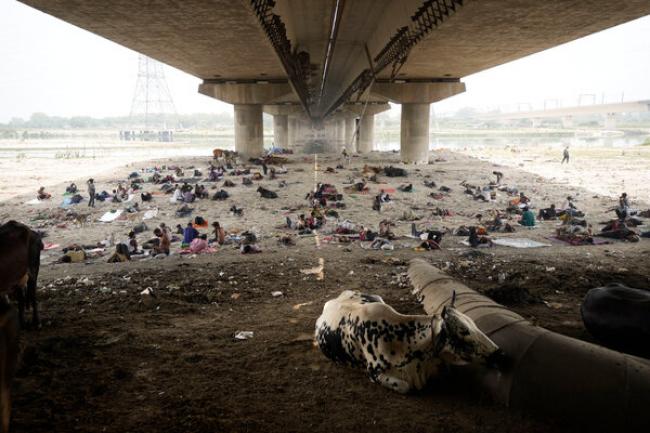Articles Menu

Jun 2, 2022
A hotter world |
|
India has contributed little to climate change: Home to 18 percent of the world’s population, it has emitted just 3 percent of planet-warming greenhouse gases. |
|
But India is suffering from climate change. It is happening right now: Over the past three months, a heat wave has devastated North India and neighboring Pakistan. Temperatures surpassed 110 degrees Fahrenheit. It is so hot that overheated birds fell out of the sky in Gurgaon, India, and a historic bridge in northern Pakistan collapsed after melting snow and ice at a glacial lake released a torrent of water. |
|
Scientists say global warming almost certainly played a role in the heat wave. And rising temperatures stand to make unusually hotter weather more common not just in India and Pakistan but around the world, including in the U.S. |
|
Indians have responded by staying indoors as much as possible, particularly during the afternoon hours. The government has encouraged this, pushing schools to close early and businesses to shift work schedules. The measures have kept down deaths — with fewer than 100 recorded so far, an improvement from heat waves years ago that killed thousands. |
|
But these measures have costs. Schooling time is cut short, so students learn less. People do not travel to their jobs, so work is less productive. The heat kept some farmers inside and stunted harvests, so crop yields fell and global food prices increased. Social life is disrupted. |
|
The situation reminds me of the mixed effects of Covid lockdowns: Measures adapting to climate change can help prevent the worst health outcomes, but they come with real costs. “We’re saving lives, but then livelihoods are lost,” Roxy Koll, a climate scientist in India, said. |
|
And many people still have to go out in the heat. Koll told me that his son recently showed signs of heatstroke after getting home from school. (The episode prompted Koll and his wife to push the school to end classes earlier.) In Delhi, the afternoon heat left Chandni Singh, a climate researcher, “extremely tired, nursing a throbbing headache and completely dehydrated” the following morning, she wrote in Times Opinion. |
A global disparity |
|
The geography of poor countries — many are close to the Equator — is not the only reason climate change is such a burden for them. Their poverty is another factor, leaving them with fewer resources to adapt. |
|
“Climate change is one of the most profound inequities of the modern era,” said my colleague Somini Sengupta, the global climate correspondent who writes The Times’s climate newsletter. “Those who did not cause most of the problem are feeling most of the impact already.” |
|
There is a paradox to the climate crisis. Because India never fully industrialized, it has not released as many greenhouse gases as the U.S., European nations and other rich countries. But because it has not industrialized, it also has fewer resources to adapt than the richer, polluting nations. |
|
|
Fewer than 10 percent of Indians have air-conditioning at home. Many lack reliable electricity, limiting their ability to use fans. The problem was especially bad lately, with a coal shortage causing power failures. |
|
There is a tension here: To adapt, countries have to adopt modern technologies. But since these technologies often require planet-warming oil and coal, their use aggravates climate change and, consequently, extreme weather. The weather then requires still more adaptation. |
|
The rush for clean energy technologies, like solar and wind power, is an effort to break that tension — to give countries a way to industrialize without the planet-warming pollution. With climate disasters already hitting much of the world, that effort is in a race against time to prevent more crises like India’s. |
|
Related: In the U.S., less access to air-conditioning, pools and even trees causes poorer Americans also to suffer more from heat waves. These recent photos from New York highlight the differences. [Top photo: Homeless people sleep in the shade of an highway overpass on a hot day in New Delhi, last month.Manish Swarup/Associated Press] |